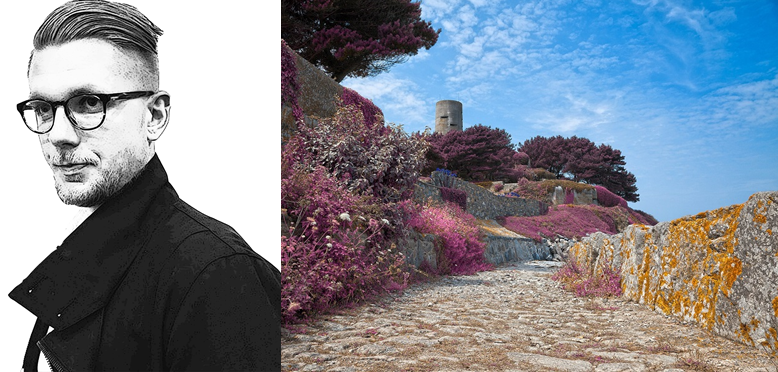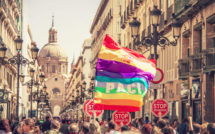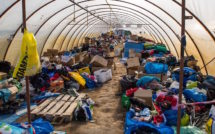

This essay is part of Morten Høi Jensen’s column European Diarist.
I read a lot of poetry in the days after Donald Trump’s election victory, partly as a means of escaping the inevitable clamor of commentators and journalists struck with a sudden case of retrospective clairvoyance, but also because certain poems seemed appropriate to the historical gravity of the moment: Yeats’ “Second Coming,” Hardy’s “A Darkling Thrush,” Auden’s “September 1, 1939.” These were, I admit, quite obvious, even predictable choices. But the poem I kept returning to, and have been returning to ever since, was Adam Zagajewski’s “Praise the Mutilated World,” with its moving imagery, gentle exhortations, and elegiac, repetitive rhythms: “Try to praise the mutilated world. / Remember June’s long days, / and wild strawberries, drops of rosé wine. / The nettles that methodically overgrow / the abandoned homesteads of exiles. / You must praise the mutilated world.” (Though not written on the occasion, Zagajewski’s poem was published in The New Yorker shortly after 9/11, on the back page customarily reserved for cartoons).
The poem’s affection for what is fragile or broken, and for the victims of history (“You’ve seen the refugees going nowhere, / you’ve heard the executioners sing joyfully. / You should praise the mutilated world”), is deeply moving, and a welcome rebuke to a world that seems to inch ever closer toward some terrible calamity. Zagajewski subsequently called the poem a manifesto of sorts, and it’s not hard to see why: “You gathered acorns in the park in autumn / and leaves eddied over the earth’s scars. / Praise the mutilated world / and the gray feather a thrush lost, / and the gentle light that strays and vanishes / and returns.” There is an appeal to compassion, to affirmation — even, one suspects, to hope.
Adam Zagajewski was born in Lvov, in Poland, in 1945. Today Lvov is better known as Lviv, the largest city in the western part of Ukraine. In the past, Lvov has been Mongol, Galician, German, Soviet, and Austro-Hungarian — “a landscape of discontinuity, of radical uncertainty,” as the poet Mark Doty said earlier this year when he presented Zagajewski with the The Griffin Trust For Excellence In Poetry’s Lifetime Recognition Award. This discontinuity is most obviously manifested in Lvov’s many names: Lwów, Lviv, Lemberg, Lemberik, Leopolis, and by the many religions and ethnicities that have populated it: Poles, Ukrainians, Armenians, Belorussians, Jews, Protestants, Catholics. During the Second World War, Lvov was occupied by Soviets (in 1939), then by Germans (in 1941), and then by Soviets again (in 1944). A Russian proverb is appropriately said to have been much on people’s minds: “A person is composed of body, soul, and passport.”
In his evocative essay, “Two Cities,” Zagajewski chronicled his family’s forcible expatriation to the industrial village of Gliwice after the war—a move made necessary by the Yalta and Potsdam conferences in 1945. During the conferences, Allied concessions to Stalin meant that Poland lost most of its prewar territories in the east (including Lvov). For the Zagajewskis, and the many other Poles affected by these decisions, the experience enveloped them in a state of near-permanent homelessness: “To be homeless,” he writes, “does not mean that one lives under a bridge or on the platform of a less frequented Metro station […]; it means only that the person having this defect cannot indicate the streets, cities, or community that might be his home, his, as one is wont to say, miniature homeland.”
Growing up in Gliwice, Zagajewski found himself surrounded by people still living in a kind of metaphysical home, in a Lvov of the mind:
They spoke about things lost. About the lost city. The hills of that city. About a certain day, long ago. About delicate and ripe raspberries. About Germans and Russians during the war: who was worse. About hunger. Siberia. About a certain servant who stole but who was so nice and helpful otherwise that she was forgiven. The city they had left was the loveliest in the world.
Zagajewski recalls a neighbor who never left his apartment, who refused to resign himself to the partitioned reality of postwar life. He walked around in blue pajamas, rejected all human contact, and left his apartment only to pace around the courtyard below, like a prisoner. “He was an old man,” Zagajewski recalls, “full of hatred and despair. He probably returned to the bygone days in is dreams, to the city he had to leave. Perhaps that is why he wore pajamas. He lived in dreams, only in dreams; his pajamas were a diving suit in which he descended into the past like a frogman.”
The experience of the people of Lvov, and the many other cities in Europe like it, is an important rejoinder to the resurgent ethnic nationalism now tightening its grip on Europe—with its nostalgia for some illusory cultural and ethnic homogeneity, for a lost golden age that never existed and to which it would not be desirable to return if it did. Europe’s past is pocked and mottled by intervals of war, revolution, terror, and strife. The Second World War was the culmination, the implosion, of the continent’s battered history. The hard-won yet unsteady peace Europe has half-known since 1945, and more fully since 1989, is so unlikely it almost seems like an aberration. The fear, of course, is that it is also just a fling, a casual affair Europe will soon tire of before guiltily trudging back to its long and unhappy marriage with war and destruction—a fear that 2016, with its upheavals and sunderings, its radical and unpredictable changes, has made forbiddingly real.
The late Stig Sæterbakken, a Norwegian novelist who killed himself in 2012, once said that to be a European is to be a dysfunctional nationalist. He wrote, “In the concept of the European lies a threat to the national.” For Sæterbakken, identifying as a European made it harder to identify as a Norwegian—made it harder to say with any real certainty, This is who I am, this is what it means to be a Norwegian. Many in today’s reactionary political climate would surely regard this as a loss, as a dilution of national identity, but for Sæterbakken it offered a kind of negative freedom, a freedom from identity that he recognized also to be one of the literature’s many strengths. By reading and writing, he suggested, we change identities all the time, and thus remind ourselves of the lives of others, and of all the other lives we may yet lead. Sæterbakken saw literature as being in this sense destructive, something that chips away at certainty, breaks down barriers, and unravels the threads of uniformity.
Praise the mutilated world, and all its negative freedom.
Morten Høi Jensen was born in Copenhagen, Denmark. He has contributed to the Los Angeles Review of Books, Salon, and The New Republic, and is the author of a forthcoming biography, A Difficult Death: The Life and Work of Jens Peter Jacobsen, due out from Yale University Press in the fall of 2017.
Photo: Morten Høi Jensen, Private
Photo: Guernsey Scenery – Violet, Nicolas Raymond | Flickr
Published on January 5, 2017.




